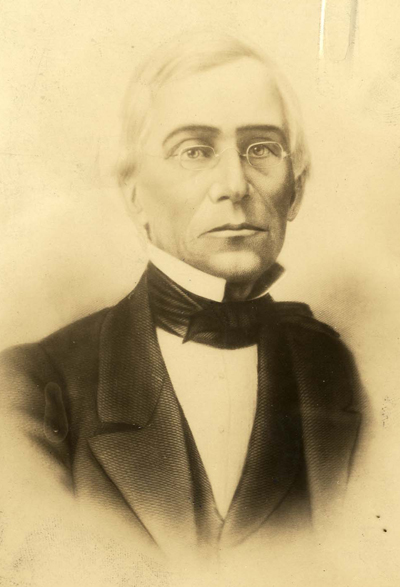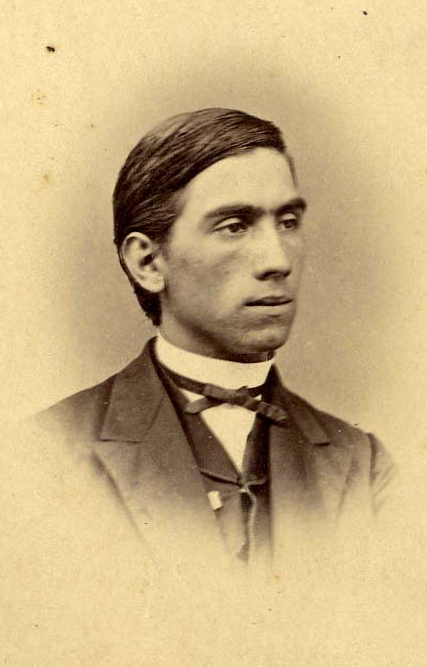 To all who are familiar with Wabash history, the name Caleb Mills and his connection to this college are as clear as the tone of the bell that welcomes our freshmen and rings out our graduating seniors. The first member of the faculty, Mills is widely considered the father of public education in the state of Indiana. Through statewide lobbying – before that term had ever been used – Mills created a groundswell of public opinion that for a state to prosper, it must educate its children and that it was the job of the state to do so. So while we all know a bit about Caleb Mills, his son Benjamin is much less well known.
To all who are familiar with Wabash history, the name Caleb Mills and his connection to this college are as clear as the tone of the bell that welcomes our freshmen and rings out our graduating seniors. The first member of the faculty, Mills is widely considered the father of public education in the state of Indiana. Through statewide lobbying – before that term had ever been used – Mills created a groundswell of public opinion that for a state to prosper, it must educate its children and that it was the job of the state to do so. So while we all know a bit about Caleb Mills, his son Benjamin is much less well known.
Benjamin Marshall Mills, only son of Caleb and Sarah Marshall Mills was born in Crawfordsville on November 17, 1846. Known to friends and family as Marshall, this young man grew up on campus and attended prep school here as well. Well liked and widely respected, this boy grew to manhood on campus. When he was old enough, he joined the Union Army serving as a First Lieutenant with the first division of colored troops of the Army of the Cumberland, serving at Vicksburg, Mississippi for 16 months during the Civil War. Upon his return home, Marshall finished his classical program and graduated with the Wabash class of 1868. He immediately began his study of medicine with two local doctors, but within six months Benjamin was dead.
The entire campus mourned and here is an excerpt from the Wabash Magazine of March of 1869. This was a tribute from his fellow students, “On the 9th of January, 1869, in the twenty-third year of his age, B. Marshall Mills died of pneumonitis, coming on in the course of hasty consumption. The tones of the college bell, as they were borne upon the evening air, fell like the chill of death upon many hearts. We have often stood by the deathbed of dear friends, but never did it seem so hard to realize the work of death in one who had so long held the place of friend and brother…His views of life were true and noble. In the choice of a profession he was guided by the desire to do good, and had his young life been spared he would have achieved a good life-work. His aspirations were high and worthy, his hopes and expectations bright…He was frank and genial in disposition. His large heartedness and warm impulses won the esteem of all who knew him. His heart was trustful, forgiving, loving…We knew him most intimately the last five years of his life, and gladly we bear this testimony, that [his] life, as known to us was blameless, his motives pure, and his purposes high and noble. And in paying this imperfect tribute to his memory our pen moves sadly, as recollection call up the many pleasant associations of college life and life in the real world. How often have we grasped that right hand, now cold; how often has its pressure assured us of welcome; how often have the beams of those eyes, now closed, lighted us to the secret recesses of that soul of whose esteem we felt sure; how often has that face, lit up by a smile, been but the window of the soul, through which we looked to a heart warm and trusting, now cold and still, while the great heart of the world rolls onward and over it. Soon his memory will pass from the mind of many, but in the hearts of some it shall live while life lasts.”
As we might suppose, the father was greatly affected by his son’s death. At that time Caleb Mills owned a great deal of land just north of Wabash and this land included a cemetery which was located behind the current Phi Psi house. The entrance to the cemetery was just off of a small street to the west. It was this street that Caleb Mills named Marshall, in memory of his only son. So as I come and go from campus, I often drive on Marshall and think about the young man who died too soon. What might he have added to Old Wabash in the fullness of time?
Best, Beth Swift Archivist, Wabash College
